News
What Nigerian Lawyers Say About Military Declaration Of IPOB As Terrorist Group
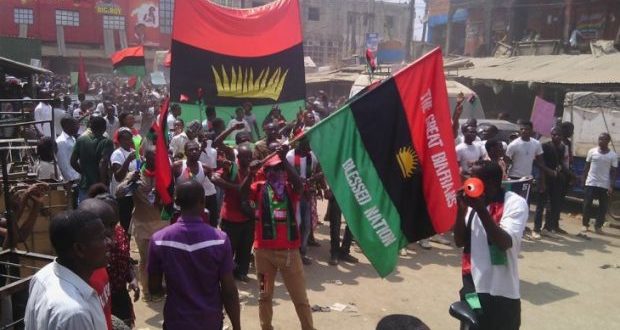
Nigerian lawyers on Friday night expressed divergent views on the legality of the military’s declaration of separatist group, IPOB, as a terrorist organisation.
While some said the military’s action was in order, others said it was not done in a constitutional manner.
A senior lawyer, Mike Ozekhome, in a statement said the instances cited by the defence headquarters in reaching its decision were not sufficient to term IPOB as terrorists.
The military cited the following as its reasons for placing the terrorist tag on IPOB: formation of a Biafra Secret Service; formation of the Biafra National Guard; unauthorised blocking of public access roads; extortion of money from innocent civilians at illegal roadblocks; militant possession and use of weapons (stones, Molotov cocktails, machetes and broken bottles among others) on a military patrol on 10 September 2017; physical confrontation of troops by Nnamdi Kanu and other IPOB actors at a checkpoint on 11 September 2017 and also attempts to snatch their rifles; attacks by IPOB members, on a military checkpoint on 12 September 2017, at Isialangwa, where one IPOB actor attempted to snatch a female soldier’s rifle.
But Mr. Ozekhome, a Senior Advocate of Nigeria disagreed with the military’s position on the matter.
“I do not believe the instances cited by the Defence Headquarters to justify declaring IPOB a terrorist organization,” he said.
“The last time I checked, I can’t remember any of such organisation operating in the country being declared terrorist organisations.
“The herdsmen who go on rampage daily, maiming, raping, killing; those responsible for the Agatu massacre; Shiites massacre, Southern Kaduna pogrom, indiscriminate killings, brazen quit notices’ givers, across Nigeria, etc, have never been arrested, prosecuted, let alone been proscribed and stigmatised as terrorist organisations.
In his reaction, lawyer and activist, Jiti Ogunye, described the declaration as ‘‘curious and strange in nature.’’
“I find it rather strange and curious that the army would declare a group a terrorist organisation. I said that because under the Section 2, subsection (C) of the terrorism prevention act 2011, it is the Attorney-General of the Federation, the National Security Adviser or Inspector-General of Police that can declare an organisation a proscribed or terrorist organisation.
“And it cannot just do so. The two arms of government have to be involved for an organisation to be proscribed. Also involved are the various arms of government mentioned, as well as the president himself who must give an approval. The executive arm of government will approach the court with an application to give an order. This is to allow for a dispassionate and rational assessment of the application to see whether it is warranted.
“The judge is not part of the executive, he is independent. We have not been told by the military or the Federal Government of Nigeria that an application has been made to the Federal High Court in Nigeria. That is why I said it is curious. If it is the military that has not done this, then it is unconstitutional and illegal. We are not in a military regime, no matter what the situation is, we have to follow the rule of law so if no order has been obtained to this effect. What has been done is unlawful,” Mr. Ogunye said.
He added that the previous declaration by the Kaduna State Governor, Nasir El-rufai, that the Shiite IMN is a terrorist group, is also unconstitutional.
“Of course, it is an illegal declaration. Who gave the Kaduna State Governor the power to do that? The right to association, freedom of opinion, right to hold an opinion, freedom of conscience and the right to freedom of speech are guaranteed. These are entrenched rights in the constitution, so when you are taking these rights away you have to follow very thoroughly and to the minutest details, the dictates of the law.
“If a power is supposed to be exercised by an authority and that power is not something you can delegate, no other authority can exercise that power. The law is that penal legislation; that is penalties that contain sanctions must be construed so narrowly lest the rights of the people will be the immediate casualty. The law construes such sections narrowly so that the slightest mistake will be held against the person who is claiming refuge to the dictates of that law,” Mr. Ogunye added.
The lawyer argued further that the declaration of IPOB as a terror group has a reverberating effect on likely innocent supporters of the group.
“It is a monstrous law; even the Ohaneze Indigbo, the South-east governors that would want to defend these groups cannot do that because the terrorism act is saying that you cannot associate with them: because if you do, you have become a co-conspirator.”
Mr. Ogunye noted that although the military has the right of way and the area reportedly overtaken by the IPOB members, where they attempted to prevent the army from passing, is not an IPOB territory, ‘‘the army themselves are not above the law.’’
“Section 1 subsection (2) of the Act that describes what a terrorist organisation is, is so wide that organisations (indeed) any organisation involved in massive mobilisation against the government of the day can be labelled a terrorist organisation.
“Section 2 (3) of the act paragraph 2 provides that for the avoidance of doubt, political parties should not be described as a proscribed organisation and nobody should be treated as such because of his or her political belief. It is true that this provision is there, but when you look at section 1 of the act which gives the wide description of organisations that can be described as a terrorist organisation, then you will see that any organisation can be regarded as a terrorist organisation if it is fighting the government for whatever cause.’’
According to Mr. Ogunye, it is important in the light of the provisions of the act, ‘‘to consider the relationship between IPOB and the acclaimed Boko Haram terrorists and, with a view to determining whether they have something in common.’’
Another lawyer, Gloria Ezedika, also cautioned against flouting Nigerian law in making such declarations.
‘‘The problem we have is that most of these people do not know what the law says. It is important to understand what the definition of terrorism is and to determine the signs of terrorism that we have seen in the actions of the actions of the IPOB members. No arm of government surpasses the law.
“The constitution should guide every act and whatever is done that does not conform with the provisions of the constitution is illegal and unconstitutional,” she said.
Also, Akinolu Kehinde, a Senior Advocate of Nigeria, said the law has to be followed fully and an order of a court is necessary before such a declaration can be made.
“The power to declare a group a terrorist group belongs to the Honourable Attorney-General of the Federation, the NSA or the IGP. After any of these arms have made the declaration, following the approval of the president, the attorney-general will now apply to the court, to get a judicial seal. The court still has to make a pronouncement,’’ Mr. Kehinde said.
However, other senior lawyers said the military’s action was not unconstitutional.
A Senior Advocate of Nigeria, Rotimi Jacobs, said the executive arm of government has the power to make the said declaration.
He added that military, working as an arm of government ‘‘can speak for the President.’’
“It should be the executive and I believe the military has the mandate of the President. The president has not said anything to the contrary, so I believe they are speaking the opinion of the President,” Mr. Jacobs said.
In his reaction, another Senior Advocate of Nigeria, Samson Ameh, said the Nigerian President had the right to declare the group a terrorist organisation, adding that the president had ‘’peculiar rights over’’ to take such an action.
.
“The president has the right to make such a declaration. He has peculiar rights regarding the security of a country. It’s like declaring a war, in America, it is called the affirmative action. That is what we call the police action here. Also, the Inspector-General of Police can make the declaration on behalf of the President,” Mr. Ameh said.
In a related matter, South-east governors on Friday announced the proscription of IPOB following the spread of the violence in the region after the organisation clashed with the military.
Also, the controversial governor of Ekiti State, Ayodele Fayose, described the “maltreatment” and “killing” of IPOB members agitating for the state of Biafra, as ethnic cleansing.
“I have said it before now that it is only God that can help the Igbo people. What I see going on in the South-east is ethnic cleansing when you see the video clips of that occupation, the behaviour of the soldiers, leaves much to be desired but they cannot act like that without a whistleblower, somebody is behind them telling them go and ‘cleanse the people,’” he said in Ado-Ekiti on Friday.
“That is recklessness, human rights violation in Nigeria today is second to none. And I hope the international community would not be quiet on this. It is unfortunate.”
Mr. Fayose, a vocal critic of the APC administration, noted that the IPOB struggle was beyond Mr. Kanu, stating that the South-east region was facing serious challenges and difficult times.
“The herdsmen wreaking havoc all over, and killing, what has the military done to deal with them? Has anyone of the herdsmen been prosecuted, let alone giving them this kind of treatment?” he asked.
“You went to court to revoke Kanu’s bail but you can’t even wait for the court to take a decision before occupying his house. Nigeria is in trouble except the Lord helps us.”
WHAT THE LAW SAYS
According to the Section 2 (c) of the terrorism prevention act, in setting up or pursuing acts of terrorism, the judge in chambers may on an application made by the Attorney-General, National Security Adviser or Inspector-General of Police on the approval of the President; declare an entity to be a proscribed organisation and the notice should be published in official gazette.
Subsection (2) of the same act adds that: “An order made under sub-section (1) of this section shall be published in the official gazette, in two National newspapers and at such other places as the judge in Chambers may determine.’’
Subsection three adds that; “A publication made under sub-section (2) of this section shall contain such relevant particulars as the judge in Chambers may specify.’ Premium Times
-
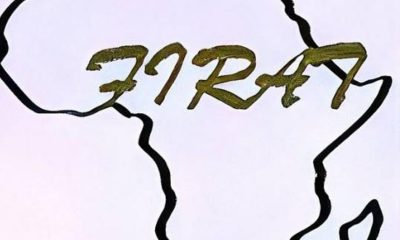
 News5 days ago
News5 days agoFIRAT Offers USD 200,000 SnapGenius Research Facility To Boost Research Excellence In African Universities
-
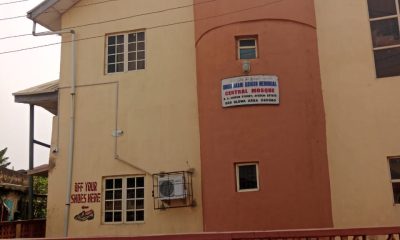
 News4 days ago
News4 days agoPolice Commence Investigation As Worshiper Mobbed To Death At Osogbo Central Mosque
-
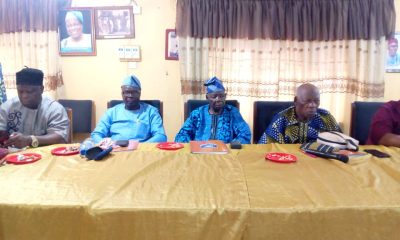
 News5 days ago
News5 days agoPensioners Threaten Legal Action Against States Over Unpaid Pension Increases, Outstanding Entitlements
-
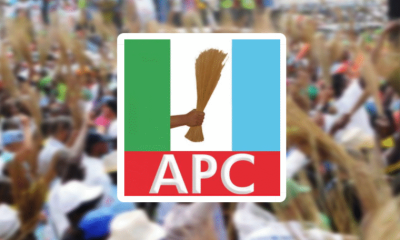
 News5 days ago
News5 days agoAPC Obokun Feud : FAS Sues For Peace, Urges Party Members To Embrace Dialogue




![Rotimi Jacobs [Photo credit: PM News Nigeria]](https://i2.wp.com/media.premiumtimesng.com/wp-content/files/2016/11/Rotimi-Jacobs-SAN.jpg?zoom=2&resize=600%2C419)



